- Home
- Joan Lowery Nixon
A Family Apart Page 11
A Family Apart Read online
Page 11
“Aren’t you from New England, too?” Frances asked.
Mrs. Mueller shook her head. “No. My husband and I settled our land even before these good friends arrived. We live just over the border in Nebraska Territory.” The laugh lines around her eyes crinkled as she giggled and whispered, “But I didn’t forget my own favorite—the potatoes. It’s my mother’s recipe.”
Frances continued to stare at the food. Would her brothers and sisters be eating this well? She was greedy to taste the fine dishes but guiltily remembered the watery cabbage and mealy potatoes that Ma had to eat. But Mrs. Mueller heaped a plate for Frances and pushed it into her hands. “Eat well,” she said. “You need a few good meals to build those young muscles.”
Some of the children had carried their plates and forks to the front porch, where they sat in a row, dangling their legs over the edge, intent on the good food they were eating. The men had taken their plates inside the house, and Frances could hear the low, comforting rumble of their deep voices. The women didn’t sit still for long anywhere but bustled back and forth between the kitchen and the table, sometimes stopping to fill their plates and stand, eating and chatting, for a few moments.
Frances didn’t know where to take her plate. The boys were too rough, and she couldn’t sit with the girls. They wouldn’t want her anyway. Thankful that no one was watching her, she slipped into the parlor, where the men were seated, and sat on the floor near the side of the fireplace. It was a warm, inviting room, and Frances had a strange sense of belonging there. As she looked around she understood why. The embroidered pillows on the chairs and the lace curtains at the windows came from the house she had built in her dreams. It was perfect, except for one thing: her family was not there with her.
The men began to speak of Abraham Lincoln. “He’s not much to look at, being a long bean pole of a man, but he’s a mighty fine orator,” Mr. Mueller said.
“You heard him speak?” a younger man asked.
“Yes, and met him, too. Last year he came to St. Joseph on the side-wheeler boat Emile, on his way to Council Bluffs.”
“You know what it means if Lincoln is elected,” someone said, and the conversation turned to the possibility of war among the states and to terrible, bloody raids made over the past few years along the Kansas-Missouri border by both proslavery Missourians and Kansas abolitionist jayhawkers.
“Lincoln will do away with slavery,” Jake said, and the others agreed.
The conversation was interesting, but the plate of food, with its mingled spicy, sweet, and pungent fragrances, demanded Frances’s attention. She decided to try a bite of pie first and didn’t stop until she had devoured every crumb. Then she attacked the rest of the meal, forgetting her manners and stuffing herself full of pork and potatoes and some strange—but delicious—things she still couldn’t name. It was only when the plate was as clean as though she had licked it, and her stomach round and tight against her trousers, that Frances leaned back against the wall and really paid attention to what the men were saying.
Someone was talking about the “Underground Railroad.” She imagined a train with tracks that rattled and rocked along through caves and caverns.
“Until the Fugitive Slave Act is abolished, the Underground Railroad is the only answer,” Mr. Mueller said.
There was silence for a moment, then a man with gray in his hair spoke up. “Don’t forget, Klaus, that taking part in helping a slave escape is against the law. There are severe penalties.”
“How can you balance penalties against helping a man to gain his freedom?”
“You would risk going to prison?”
A young man leaned forward and spoke earnestly, holding up a hand to interrupt Mr. Mueller. “Wait. Think for a moment before another word is said. We are all neighbors and good friends here. We can trust one another. But we still should not be too outspoken. We are all working within the law to help Kansas become a Free State. That is the first step.”
“The process is slow,” Mr. Mueller grumbled.
The man’s tone became more deliberate. “None of us knows anyone who is a part of the Underground Railroad. Let us keep it that way.”
Jake stood up. “More coffee, Klaus? William? Henry? Let me fill your cups.”
The young man bounced to his feet. “Real coffee, and not roasted rye! This is quite a party!”
“Aha!” Mr. Mueller said, his mood changing to match the others’. “Wait until the Christmas season. That will be a party. Frieda will bake a Christmas cake big enough to feed the whole countryside!”
“With plenty of raisins?” someone asked, laughing.
“Yes, raisins! And, Henry, we’ll expect you to bring your fiddle.”
“I would bring it, even if you hadn’t asked me to!”
A few minutes later the young man put down his cup and said, “It’s time for me to collect my family and prepare to head for home.”
“Also for me,” another one said.
By this time all the men were on their feet. Some of the women began hurrying into the house, and Frances made her way to the kitchen. She could never have imagined a kitchen like this one.
It was a large, square room with a huge fireplace at the far end. A row of long-handled iron skillets, two large kettles, ladles, a toasting fork, and some other cooking tools hung on pegs above the fireplace. Next to the hearth stood a cupboard with double doors. An ornate, round wood stove was at one side of the kitchen, a cloth-covered table and some ladder-back chairs at the other. Near the center of the room was a sturdy worktable, and against the inside wall were shelves laden with stoneware jars and crocks of all sizes, tinware, and kitchen tools that Frances had never seen before. The room was cozy with the odors of food, the leftovers of which were now being parceled out among the women and tucked into cloth-covered baskets. Oh, Ma! Frances thought. You wouldn’t believe this wondrous kitchen unless you could see it with your own two eyes!
It hurt too much to think of Ma. Frances knew she had to get busy to force her mind to go in another direction. With a folded towel to protect her hands, she swung out the iron crane from inside the fireplace and removed a steaming kettle from its pot hook, pouring the water into two large, metal bowls that had been set on one of the tables. The youngest woman—Mrs. Busby—thanked Frances. Into one of the bowls Mrs. Busby stirred a dollop of soap from a jar of scrapings and water that sat on the windowsill. She then added a small amount of cold water to both bowls.
Frances immediately dumped the tray of used forks and knives into the soapy water and began to rub them clean.
Mrs. Busby’s eyes opened wide with surprise. “Where did you learn to wash dishes like that?” she asked.
Puzzled, Frances frowned. “Am I doing it wrong?”
“Oh, no,” Mrs. Busby said. “It’s just that you don’t often find boys willing to do women’s work.”
Frances fumbled for the right words to cover her mistake. “If work needs to be done, what difference does it make who does it?” She ducked her head and scrubbed hard at the utensils.
“My, my,” Mrs. Busby said. “I like the way you think, young man.” She picked up a bleached flour sack and began to dry the utensils that had been washed and rinsed.
I’ve got to be more careful, Frances reminded herself, so when Margaret came to shoo Frances out to play with the other boys, she went without protest.
As she left the kitchen, Frances heard Mrs. Busby say to Margaret, “Frankie is a gentle boy,” so she deliberately found Elton and picked a quarrel They pummeled each other and rolled in the dirt, until two of the men pulled them apart.
“Just havin’ fun,” Elton mumbled to his father.
“Is that right, Frankie?” Jake asked.
Frances shook her head. “No, but the fight was my fault. I pushed him.”
Mr. Mueller laughed loudly. “An honest answer. The boys are angry now, but in a few minutes they’ll be friends.”
Frances held out her right hand toward Elton. “Shak
e on it,” she said.
Grudgingly Elton did. The sun had dipped low and red in the western sky, and it was time for the party to end. Within a few minutes Elton and his family were in their wagon, heading for their own farm. The few families who had tarried shouted their good-byes, too, until the Muellers were the only guests who remained.
“They’ll stay the night,” Margaret explained to Frances, “because the ride back to their home would take them far too long. If you have no objections, we’ll offer your bed to Klaus and Frieda. We’ll put little Karl and Matthew in with Peter, and we’ll lay pallets on the floor in front of the kitchen fireplace for you, Johnny, and Fred.”
“A houseful of boys!” Mrs. Mueller laughed, waggling a finger at them. “And you must all go to sleep without chattering late into the night, because we have to rise early to begin our drive home.”
As darkness fell, quilts and pillows were carried to the kitchen and piled on the floor near the fireplace. Barker curled up under the table by the wall as though to protect the spot that belonged to him.
Frances glanced around the kitchen. It was so different from home, where they lived in only one room and all the children shared one big bed. For just an instant Frances yearned with all her heart for her own home, with her brothers and sisters and Ma. Then she sharply reminded herself that this place was her home now, and she would do her best to accept the fact that there was no turning back.
Margaret paused to look at Frances. “Oh,” she said. “I didn’t think. You and Peter must want a bath after your long journey. Well, we can bring the tub into the kitchen and take care of that as soon as I have some water heated.” She picked up the kettle and headed toward a large pottery crock of water.
Frances stumbled in front of Margaret, blocking her way. “No!” she cried. She tried to talk calmly. “Petey is much too tired,” she said. She faked an open-mouthed yawn. “And so am I. Could we wait until tomorrow?”
Frances held her breath in suspense until Margaret shrugged and said, “If you’d rather.”
“I’d much rather,” Frances insisted.
Margaret glanced at Petey, who was almost asleep on his feet, too tired to protest being taken from Frances to be tucked into a strange bed. “I suppose you’re right,” Margaret said. She scooped Petey into her arms while Mrs. Mueller gathered Karl and Matthew and headed for the stairs.
Fred, who was a younger version of his brother Johnny, immediately pulled off his square-toed boots, his stockings, and his trousers and dove into one of the pallets. “Ha, ha!” he shouted. “I got the best spot!”
“That’s what you think,” Johnny said as he winked at Frances. “You got the quilt with the itchy, nasty old bedbugs in it”
Fred scrambled out of the quilts so fast he kicked the pallet apart. “Bedbugs? Where?” he demanded.
Johnny laughed loudly, and Fred angrily tried to make up the bed again, muttering, “You think you’re so funny, but that was dumb. You’re a dumb, stinkin’ old skunk’s bottom!”
Frances returned Johnny’s grin. “I’m still hungry,” Johnny said to Frances. “I’m going to get an apple. You want one, too?”
Frances took the apple that Johnny held out to her and followed him outside, sitting next to him on the stoop in the darkness.
“How old are you?” Johnny asked.
“Thirteen,” Frances said.
Johnny sounded smug. “I’m fourteen.”
“I’m near to fourteen.”
“I’m near to fifteen.” He paused, taking a large bite from the apple. “My pa and your new pa are best friends.”
The apple cracked as Frances bit into it. Tart juice sprayed her face, and she wiped it away with the back of one hand.
“We used to live in Pennsylvania. That’s near New York, where you come from,” Johnny said. “But I don’t remember it much, because I wasn’t very old when we moved to Nebraska. Did you like traveling on a train?”
“Sort of and sort of not,” Frances mumbled around a mouthful of apple. She swallowed hard and said, “At first it was different—all the new things to see. I never saw a farm before. But trains stop a lot to get water and wood, and they rock back and forth and rattle, and it’s hard to sleep.”
“That sounds boring.”
“It was kind of boring, except for when we had to stop to put out a brushfire and when some outlaws robbed the train.”
“Huh!” Johnny whirled to stare at Frances, his eyes gleaming in the darkness. “You’re making that up!”
“Am not!”
“Then tell me. Tell me about the outlaws!”
“The fire first,” Frances said. “I’ll tell you about the outlaws later.” Much later, she thought. She didn’t want to tell him about Mike and what he had done. To make her story about the fire last longer, she put in everything she could remember, even the way the hot sparks shot from the smokestack on the train.
As she finished, Johnny let out a long whistle. “You’re good at telling a tale! Tell about the outlaws now.”
Frances shook her head. “I’ll tell you some other time. I’m ready to go to sleep.” She stood up and walked around the stoop to the bench. Once more she washed her face and hands.
Johnny watched her. “How come you’re washing up again? Nobody said you had to.”
“We always washed up before going to bed. That was one of Ma’s rules.”
“Your ma? But—oh.” Johnny quickly looked away, then turned and threw open the kitchen door.
Only the banked coals in the fireplace lit the kitchen. Frances took off her jacket, boots, and stockings and climbed under the quilts, as far away from Fred and Johnny as she could get She pulled the quilt up to her chin. It was warm and cozy, and she burrowed deeply into it. She squeezed her eyes shut. Jake and Mr. Mueller still were talking in low tones in the parlor. Then the house was still, except for the creak-crack of the wooden stairs as the men went up to bed.
The house was filled with people, yet Frances had never felt so lonely. When would she see Megan again? And Peg and Danny and Mike? Although she tried to fight them back, hot tears spilled down her cheeks, and she gave a loud sniffle.
She heard Johnny turn toward her. “Ma said you had to leave your other brothers and sisters,” he whispered. “If I had to leave Matt and Karl and even old froggy Fred over there, I’d cry, too.”
Frances sniffled again and mumbled, “I don’t mean to cry.”
“My pa said it’s all right to cry sometimes. He told me he cried once when he was a grown man and right out in front of everybody. He cried ’cause he saw a man get shot and killed.”
Frances wiped at her eyes. “I’m sorry I woke you.”
“You didn’t wake me,” Johnny said. “I couldn’t sleep, thinking of the fine story you told about the fire.” There was a long pause, then Johnny said, “Hey, Frankie. I’m glad we’re friends.”
“Me, too,” Frances said, surprised that she really was glad.
The quilt at the far end rose in a quivering hump. “Close your big, ugly mouths,” Fred growled. “I’m trying to sleep!”
Frances stuffed a fist in her mouth, suppressing a giggle, which turned itself into a yawn. The Cummingses were good people, and at least Petey was with her. She wouldn’t let herself think of anything else. Frances yawned again and slid headfirst into sleep.
11
THE SKY WAS barely light when Frances, Johnny, and Fred were rousted out of bed.
For a moment Frances didn’t know where she was. Her body was still caught in the rocking, jerking rhythm of the train. Instinctively she reached out for her family but was jolted awake as her fingertips met only the hard plank floor.
Megan, Mike, Danny, and Peg—were they all right? Had they awakened with eyes still burning from tears, as she had? And what was Ma doing? Ma, Frances thought. Oh, Ma, what have you done to us? How could you have sent us so far away?
“Get up, sleepyheads!” Mrs. Mueller called, and Frances forced herself to roll from under the war
m quilt and pull on her stockings and boots.
Frances carried in armloads of wood for the stove and fireplace, while Johnny made a few trips to the well, filling the large pottery crock with water. Mrs. Mueller and Margaret bustled from table to stove, and before long everyone was eating hot buckwheat cakes with cane molasses and crisp pan sausage. Petey was so happy to be eating he didn’t look at all sad or homesick.
Barker was the first to hear the hoofbeats. He rose to his feet and growled.
Margaret held up a hand for silence. “Riders,” she announced.
Jake and Mr. Mueller pushed back their chairs and strode through the parlor to the front door.
“It’s the marshal,” Jake called. “A couple of men are with him.”
Barker and the children raced after the men to the front porch, the women following. Frances saw Margaret and Mrs. Mueller glance at the men on horseback, then at each other with concern.
The marshal touched his hat to the women and smiled easily. “Mornin’, Jake, Klaus. You got quite a passel of young’uns there.”
“Meet our new sons,” Jake said proudly. He picked up Petey and put an arm around Frances’s shoulders before introducing them to Marshal Dawson.
The marshal was a big man, brown from the sun. He wore a broad-brimmed hat and a leather jacket that looked much like the ones Frances had seen on the frontiersmen in St. Joseph. The men who were with him were dressed the same way. Although the marshal had a friendly smile on his face, his two companions scowled. Both men carried rifles in slings on their saddles.
Margaret stepped forward. “Care for some breakfast, Marshal Dawson? Maybe a cup of coffee?”
“Well, maybe I—”
“We got business to take care of,” one of the other men growled. “There’s no time for that.”
The marshal nodded reluctantly. “Jake, we’re huntin’ a pair of runaway slaves.”
Mrs. Mueller sniffed contemptuously. “Bounty hunters!”
“Hush,” Margaret whispered, but the men ignored her, and the marshal continued.
“We’re pretty sure that they crossed the river somewhere below St. Joe and are probably headin’ north into Canada. Big, strong fellow and a woman ’bout maybe five feet tall. Her mistress said the woman might a’ been wearin’ a shawl she give her. It’s black with some blue flowers embroidered in one corner. You seen any sign of them, Jake?”

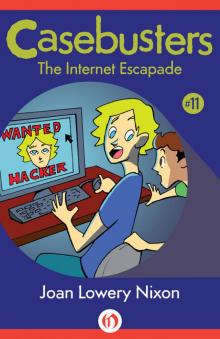 The Internet Escapade
The Internet Escapade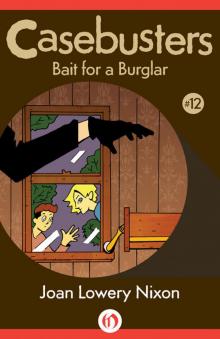 Bait for a Burglar
Bait for a Burglar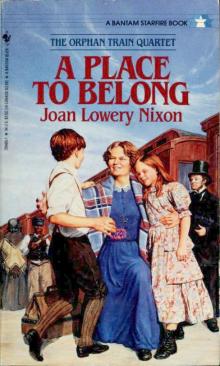 A Place to Belong
A Place to Belong Nightmare
Nightmare Sabotage on the Set
Sabotage on the Set The Other Side of Dark
The Other Side of Dark Whispers from the Dead
Whispers from the Dead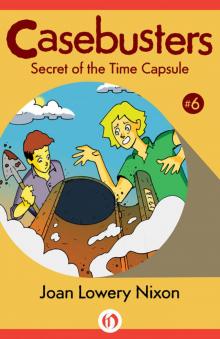 Secret of the Time Capsule
Secret of the Time Capsule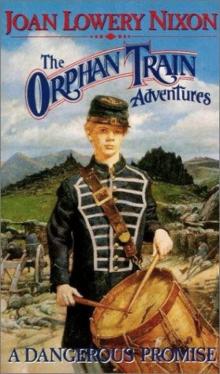 A Dangerous Promise
A Dangerous Promise Laugh Till You Cry
Laugh Till You Cry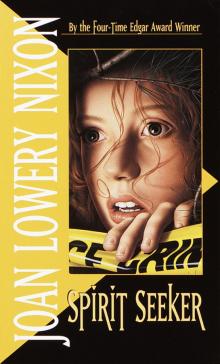 Spirit Seeker
Spirit Seeker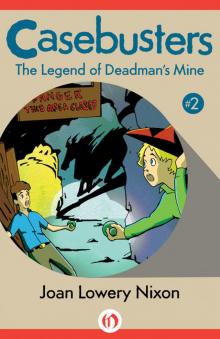 The Legend of Deadman's Mine
The Legend of Deadman's Mine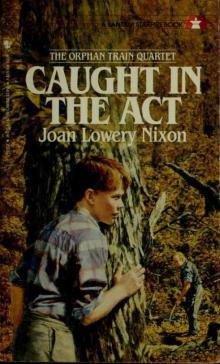 Caught in the Act
Caught in the Act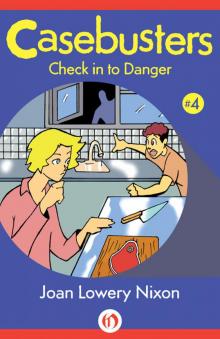 Check in to Danger
Check in to Danger Ellis Island: Three Novels
Ellis Island: Three Novels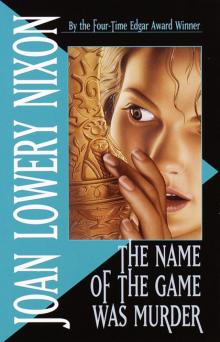 The Name of the Game Was Murder
The Name of the Game Was Murder The Haunting
The Haunting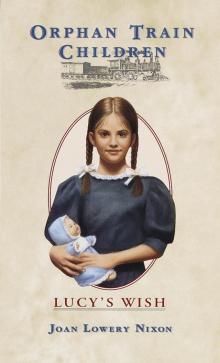 Lucy’s Wish
Lucy’s Wish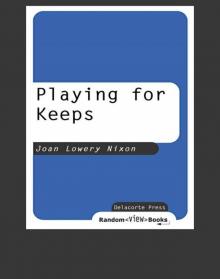 Playing for Keeps
Playing for Keeps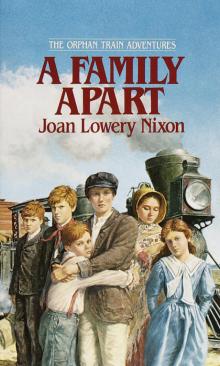 A Family Apart
A Family Apart Nobody's There
Nobody's There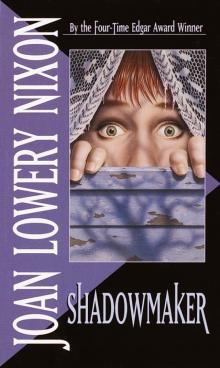 Shadowmaker
Shadowmaker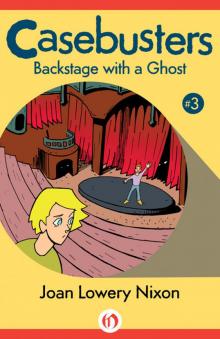 Backstage with a Ghost
Backstage with a Ghost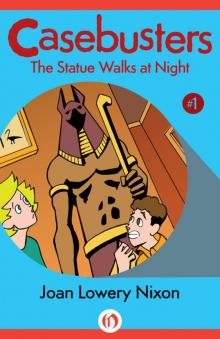 The Statue Walks at Night
The Statue Walks at Night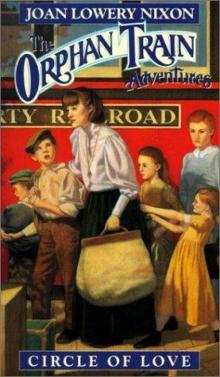 Circle of Love
Circle of Love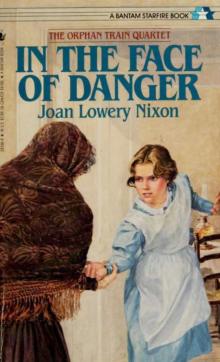 In the Face of Danger
In the Face of Danger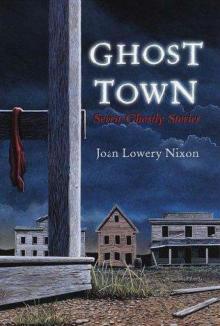 Ghost Town
Ghost Town A Candidate for Murder
A Candidate for Murder The Weekend Was Murder
The Weekend Was Murder The Island of Dangerous Dreams
The Island of Dangerous Dreams The Ghosts of Now
The Ghosts of Now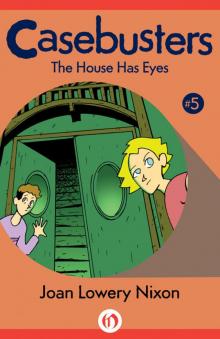 The House Has Eyes
The House Has Eyes The Dark and Deadly Pool
The Dark and Deadly Pool Keeping Secrets
Keeping Secrets Secret, Silent Screams
Secret, Silent Screams Beware the Pirate Ghost
Beware the Pirate Ghost Search for the Shadowman
Search for the Shadowman Haunted Island
Haunted Island